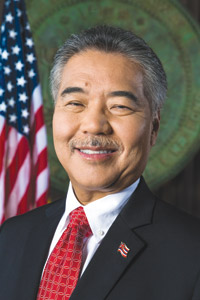It’s Just What We Do In Hawaii
Deadlines and word lengths leave too many stories unpublished in a writer’s notebook — stuff that someday will be tossed with last night’s fish bones.My December sessions with Dawn and David Ige left more than a few.
Following last November’s election, I attended the dinner meeting of a local Okinawan organization: three tables at a Chinese restaurant in Moiliili, supping with people named Arakawa, Nakasone, Higa, Chinen and the like.
The wide-ranging dinner table conversation included discussion of the potency of awamori, the traditional Okinawan rice wine we sipped.
But talk always came back to the election of Hawaii’s first Okinawan governor. Someone mentioned the Okinawan newspapers’ front-page coverage of the event, someone else offered lighthearted criticism of David Ige’s ignorance of traditional Okinawan dance steps.
Throughout the evening, a quiet pride suffused the group: an Uchinanchu, historically a target of discrimination from the Naichi, Japanese, of the four main islands, had won Hawaii’s highest office.
Ige hardly noticed. “It’s one of those things you don’t think about while you’re campaigning,” he says.
“My election was important to Okinawans, perhaps more so in Okinawa itself. But we lose track in Hawaii. Hawaii elected the first AJA governor, the first Hawaiian governor and U.S. senator, the first Filipino governor.
“We do it all the time. We celebrate diversity. Look at the crowds at the Okinawan Festival on Labor Day. That day everybody’s an Okinawan. We make space in this global world.
“Besides,” says Ige, “I’m only half Okinawan.”
Such acceptance has not always been the case. My first landlady in Hawaii lived in a modest home on the edge of Kahala. She was a late-50s widow, worked as a nurse, loved to dance and dated several handsome middle-aged gentlemen.
One afternoon we met near her washing machine, where I was doing my laundry. Overdosing on effrontery, I asked her, “Why don’t you remarry?”
“Because I don’t want to have to wash any man’s socks again,” she replied, staring at my pile of socks, T-shirts and underwear.
“But what about the contractor?” I asked.
“He’s rich. He wines you and dines you, takes you to fancy places, shows up here driving beautiful, expensive cars. He’s got enough money that you could send his socks out to be laundered.”
“Oh, Dan,” she said in a near whisper, “you wouldn’t understand. My mother would roll over in her grave.” Her Naichi mother.
As a son of the Great Midwest, I didn’t understand. We stockpiled prejudices back there; regarding Naichi or Uchinanchu, we were completely ignorant.
And by 1982, the year Ige married Dawn Amano, so too were her Naichi parents.
“The issue never came up,” says Mrs. Ige.
Dawn Ige is a strong woman, and she’d have dismissed it if it had. She trained as a journalist at the university, in public relations with the Stryker-Weiner firm, then moved on to Kapiolani Healthcare — while earning an MBA.
Kids came, changing people’s lives as they always do. The Iges’ three children were born between 1990 and 1995.
“I read to them a lot,” Dawn remembers, “and watched them develop.
“I realized that teaching and literature, the process of teaching children, it was a richer environment.”
So she went back to school for a professional diploma in elementary education, and has since taught everything from third grade to high school before becoming an elementary school vice principal.
We do “make space” in this global world, and we educate the children.
dbboylan70@gmail.com




